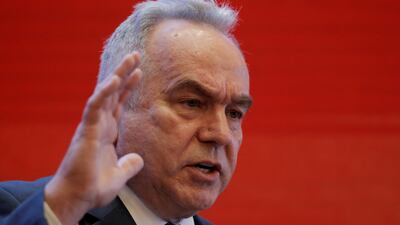The US Senate on Tuesday confirmed Kurt Campbell as deputy secretary of state.
The Senate voted 92-5 in the confirmation for Mr Campbell to assume the State Department's number two position under Secretary of State Antony Blinken.
He will resign from his post with the White House National Security Council, where he has been President Joe Biden's deputy assistant and co-ordinator for Indo-Pacific affairs,
Mr Campbell's nomination in November came as Washington tries to “pivot to Asia” from the Middle East, a goal he is credited with crafting while he served under president Barack Obama.
His confirmation comes as that pivot faces a reckoning on the global stage, with concerns that Washington's repeated attempts to disengage from the Middle East in favour of the Indo-Pacific have played a hand in the regional chaos sparked by the Israel-Gaza war.
Foreign relations committee chairman Ben Cardin endorsed Mr Campbell's nomination from the Senate floor on Tuesday, urging his confirmation “without delay".
“I don't have to remind my colleagues of all the challenges we have around the world. We need a full diplomatic corps there to represent the United States interests,” Mr Cardin said.
Mr Campbell “has the expertise to help navigate the department and our nation through complex global challenges", he said.
Mr Campbell is replacing Wendy Sherman, who retired this summer.
Walls
Louis Tomlinson
3 out of 5 stars
(Syco Music/Arista Records)
'THE WORST THING YOU CAN EAT'
Trans fat is typically found in fried and baked goods, but you may be consuming more than you think.
Powdered coffee creamer, microwave popcorn and virtually anything processed with a crust is likely to contain it, as this guide from Mayo Clinic outlines:
Baked goods - Most cakes, cookies, pie crusts and crackers contain shortening, which is usually made from partially hydrogenated vegetable oil. Ready-made frosting is another source of trans fat.
Snacks - Potato, corn and tortilla chips often contain trans fat. And while popcorn can be a healthy snack, many types of packaged or microwave popcorn use trans fat to help cook or flavour the popcorn.
Fried food - Foods that require deep frying — french fries, doughnuts and fried chicken — can contain trans fat from the oil used in the cooking process.
Refrigerator dough - Products such as canned biscuits and cinnamon rolls often contain trans fat, as do frozen pizza crusts.
Creamer and margarine - Nondairy coffee creamer and stick margarines also may contain partially hydrogenated vegetable oils.
The White Lotus: Season three
Creator: Mike White
Starring: Walton Goggins, Jason Isaacs, Natasha Rothwell
Rating: 4.5/5
PREMIER LEAGUE FIXTURES
Tuesday (UAE kick-off times)
Leicester City v Brighton (9pm)
Tottenham Hotspur v West Ham United (11.15pm)
Wednesday
Manchester United v Sheffield United (9pm)
Newcastle United v Aston Villa (9pm)
Norwich City v Everton (9pm)
Wolves v Bournemouth (9pm)
Liverpool v Crystal Palace (11.15pm)
Thursday
Burnley v Watford (9pm)
Southampton v Arsenal (9pm)
Chelsea v Manchester City (11.15pm)
More on animal trafficking
Singham Again
Director: Rohit Shetty
Stars: Ajay Devgn, Kareena Kapoor Khan, Ranveer Singh, Akshay Kumar, Tiger Shroff, Deepika Padukone
Rating: 3/5


